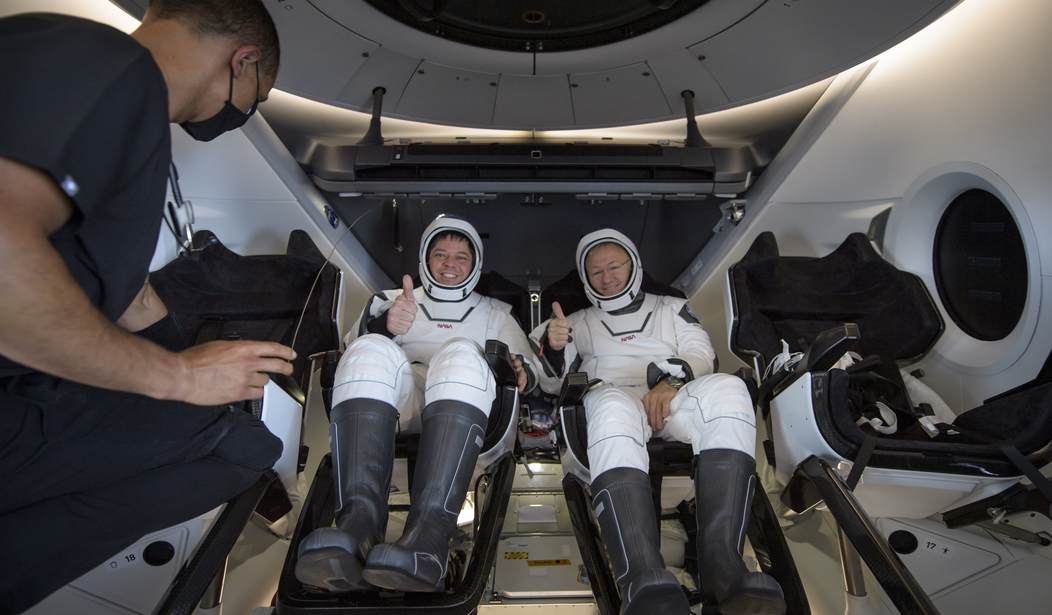Buzz Aldrin is right – America’s civilian and national security depends on space exploration. To ensure this type of American exceptionalism continues into the future, we should follow the advice and guidance that he provided in a recent Wall Street Journal op-ed entitled “Now, Go Where No Man Has Gone Before” where he discusses the importance of space tourism and reasserting broader American leadership in space.
We are making small steps, and now need to make bigger ones. In the past few weeks, America’s space leadership received a major boost with the successful launch, orbit, and safe return of civilians to Earth on an extraordinary effort of national importance. It proved our nation’s resolve, strengthened our faith in the idea that we Americans can accomplish anything we set our minds to, and ushered in a new era of space tourism. Last month, Space X successfully launched the “Dragon” spacecraft from Pad 39A at Cape Canaveral, taking four crew members to orbit on the world’s first all-civilian mission – a truly pathbreaking endeavor.
Pad 39A is the same launch pad that sent Neil Armstrong, Buzz Aldrin, and Mike Collins to the Moon. As we move forward, we again must work diligently to take the lead in human space exploration. When the Apollo 11 crew launched on a Saturn V rocket and headed for the lunar surface, Americans looked up, and gathered to celebrate. It was an American launch; but more importantly, it was a historic and ground-breaking undertaking aimed at landing the first men on the Moon – both American.
The goals of Apollo 11 were to demonstrate what a free people can do. America first proved its exceptionalism in space nearly 60 years ago with Alan Shepherd’s suborbital launch, followed by over 160 separate human launches. All were critical and facilitated substantial progress towards establishing American pre-eminence in space.
Recommended
Aldrin warns American leadership in space may be waning; therefore it is critically important and urgently needed that we American’s rekindle our passion for manned spaceflight. Towards that end, as Aldrin makes clear, we must discuss the importance of why we must reassert our lead in additional human missions to the Moon and fulfill long-awaited human missions to Mars. According to Aldrin, returning to the Moon and Mars requires longer-term investments. On the one hand, getting to the Moon first requires improving space-based infrastructure. On the other hand, getting to Mars requires us to properly calculate launch trajectories, improve re-entry speeds, refine radiation protection equipment, and assure high-quality human life support is established for the mission duration.
Aldrin notes that these bold goals and achievements will encourage and inspire a new generation to invest in human space exploration and expand America’s role in space.
This is why last month’s Inspiration4 mission was so critical. The purpose of that flight was to prove it can be done, the very essence of what both American ingenuity and human space exploration are all about.
This historic flight proved that a group of all-civilian, non-professional astronauts can board a private spacecraft and blast off into orbit for three days. It also demonstrated that a private company can ferry humans safely to and from orbit, much like a transatlantic flight, without government assistance. At its core, it symbolized risk-taking, American entrepreneurship at its best.
The Inspiration4 crew is not the first non-government trained group to go to space. In the early days of the Space Shuttle Program, NASA expected to fly so frequently that it would be able to accommodate average Americans. To expedite this process, they sought to send a teacher to space, then a journalist, and then an artist. Even Congressional members went to space, including U.S. Navy pilot and former Senator Jake Garn (R-UT) and then-Representative Bill Nelson (D-FL), who now serves as NASA Administrator. Tragically, these civilian participant flights all changed following the Challenger explosion in 1986.
Last month’s Inspiration4 flight and Blue Origin’s NS-18 mission in October gave Americans a chance to see what the future of civilian space flight might look like under American leadership. Our nation was exhilarated, inspired, and gratified to see an American rocket, carrying civilian American astronauts, from American soil, into space and safely returned. As Aldrin would say, now we must look towards the future but also remember to apply lessons of the past. It is time to look beyond Earth’s orbit and again towards the Moon and Mars.
In all of this, one basic truth is clear: If America cannot freely operate in space – for civilian and military purposes – much of what we do on Earth becomes impossible, will be compromised, or perhaps unreliable. That is why prioritizing and reaffirming America’s leadership in space is, in effect, an act of proactive national defense. Space matters.

























Join the conversation as a VIP Member